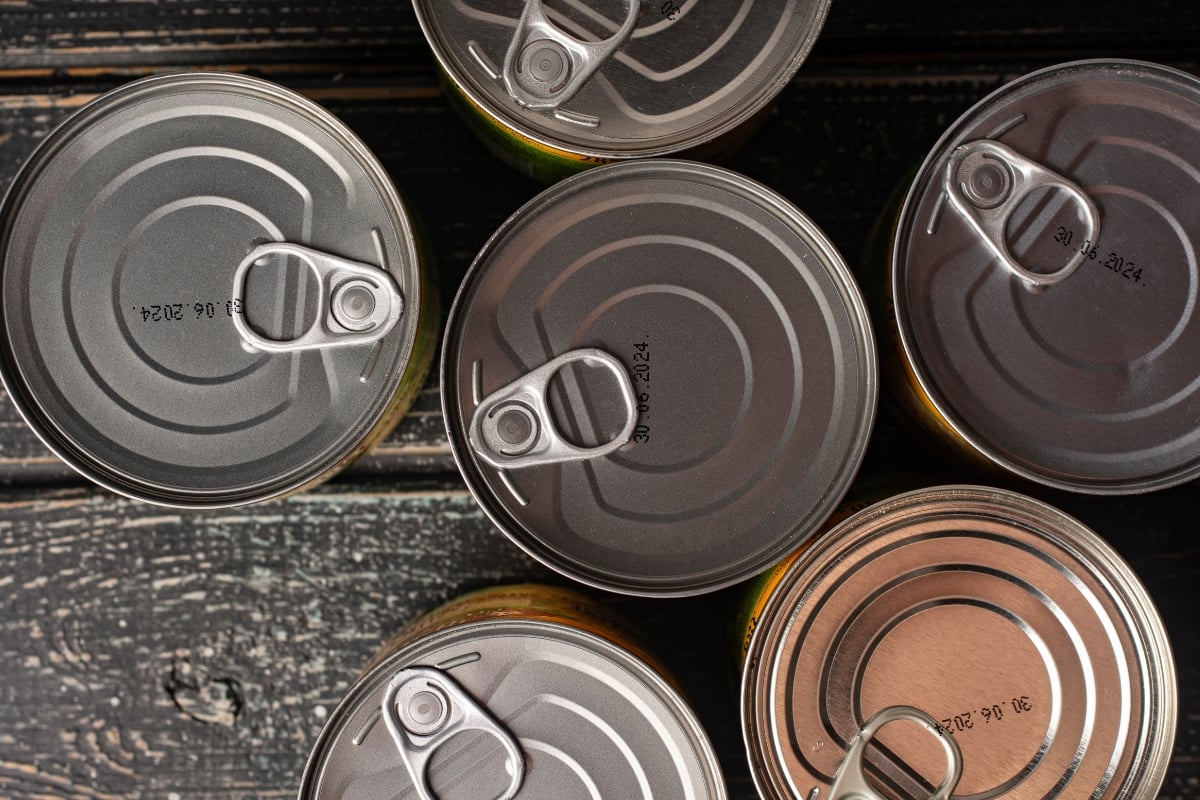Storing Canned Food in Your Emergency Food Storage: The Basics


[ad_1]
Some of the links in this post may contain affiliate links for your convenience. As an Amazon associate I earn from qualifying purchases.
You may be aware of the recent tragedy of the mass shooting that occurred in a small town in Maine. For the sake of the safety of the townspeople, government officials locked down nearly all nearby businesses, including grocery stores, which caused many unprepared people to panic as they realized they didn’t know how long the lockdown would last. As one Facebook commenter who lived close by to the site of the shooting put it, “I am watching Facebook posts of people who are panicked because the stores are all closed. It has been less than 24 hours and people don’t have food in the house.”
Canned food is one of the easiest, most accessible ways you can start building up your emergency food storage pantry. With the nearly unprecedented number of man-made catastrophes and natural disasters we have endured in the past few years, and the threat of still more to come, now is a great time to think about what you want in place before the next disaster happens. Constantly being caught off-guard is a sure recipe for panic, insecurity, and desperation. Regularly perusing your local grocery store’s canned food aisle is a quick and easy way to round out your food storage without breaking the bank.


Why Use Canned Food for Food Storage?
Canned food has many benefits for your food storage pantry. It’s affordable, easily accessible, and doesn’t require extensive preparation to eat. Back in 2012, my husband and I made an initial trip to the grocery store to stock our emergency food storage pantry. If you review the list of foods we bought, you’ll notice a significant amount of canned food for these very reasons.
Here is a short list of some of the pros and cons of using canned food as a staple in your preparedness arsenal.
Pros
Cons
The Best Ways to Store Canned Food
One of the greatest enemies of food storage is heat. This can speed up the deterioration of your food storage and even have a negative effect on the containers it is stored in.
To guarantee your stash of canned food lasts as long as possible, keep it far away from places in your house that get especially hot during the day or in the warmer months of the year. These locations could get too hot for food storage. Attics, garages, or other non-air conditioned areas are places you will want to avoid. Otherwise, you can stash your food storage just about anywhere.
The great thing about cans of food in particular is that you can pack a lot of them into a relatively small amount of space. It’s easy to find discreet places to stash a few dozen cans, such as under beds, the bottom of closets, in unused drawers, under sinks, in the basement, and so on.
The key is being able to access them easily, so you can maintain a rotation of your cans to guarantee you aren’t keeping them too long after the “best by” date. Keep in mind that the food is not necessarily spoiled or unusable after the “best by” date, but it is a good general practice to stay on top of it and make sure your canned food is as fresh as possible.
You can use any kind of box, bin, or palette to keep your cans orderly and neat. Here is how one follower organizes her cans of food–in empty soda can boxes!
Rotating Your Stash of Canned Food
“FIFO,” or “First In, First Out” is a good principal to live by with your food storage. If you know the expiration date is coming up for some of your food, the best thing to do is try and use it up! If you are consistently buying canned goods your family regularly uses, you can easily incorporate them into your weekly meals before they expire.
One brilliant reader buys about two dozen cans of food at a time all with approximately the same “best by” date, then stores them all together in a box marked with either Thanksgiving or Easter of the year the food expires–whichever holiday is closest to but not after the “best by” date. Then, if she has not been able to use up the cans of food before the date on the box, she takes the rest to her local food pantry to donate. This way, the food does not go to waste in the trash or get forgotten in storage.
Final Thoughts
Don’t wait to get started on your food storage journey! Building a reliable food storage pantry with canned items ensures not only convenience but also peace of mind. The accessibility, affordability, and long shelf life make canned foods an indispensable ally in times of crisis.
What role does canned foods play in your emergency food storage?
[ad_2]
Source link
Recent Posts
Dear Diary, It’s Me, Jessica: Part 16
[ad_1] If you're new here, you may want to subscribe to my RSS feed. Thanks…
Google Faces Lawsuit After $5M in Crypto Stolen via Play Store App
[ad_1] A Florida woman, Maria Vaca, has sued Google in a California state court, alleging…
All About Water Purification: A Complete Tutorial
[ad_1] You may need to purify water to make it safe to drink. The process…
Protocol Village: Quai Releases Mainnet-Compatible Devnet, Crunch Lab Raises $3.5M
[ad_1] The latest in blockchain tech upgrades, funding announcements and deals. For the period of…
The Grim New Daily Life in Venezuela
[ad_1] If you're new here, you may want to subscribe to my RSS feed. Thanks…
World’s 3rd largest public pension fund buys $34M MicroStrategy shares
[ad_1] The third-largest public pension fund in the world has just bought nearly $34 million…
